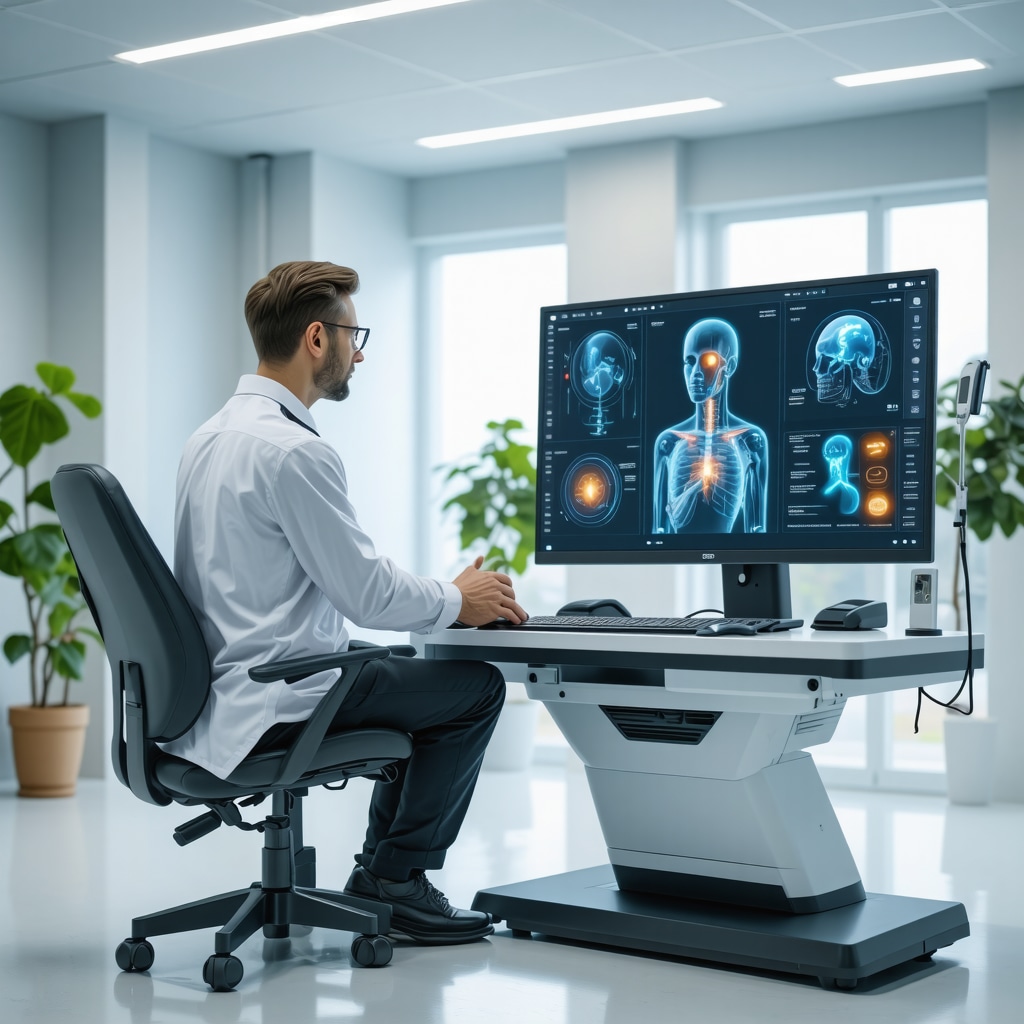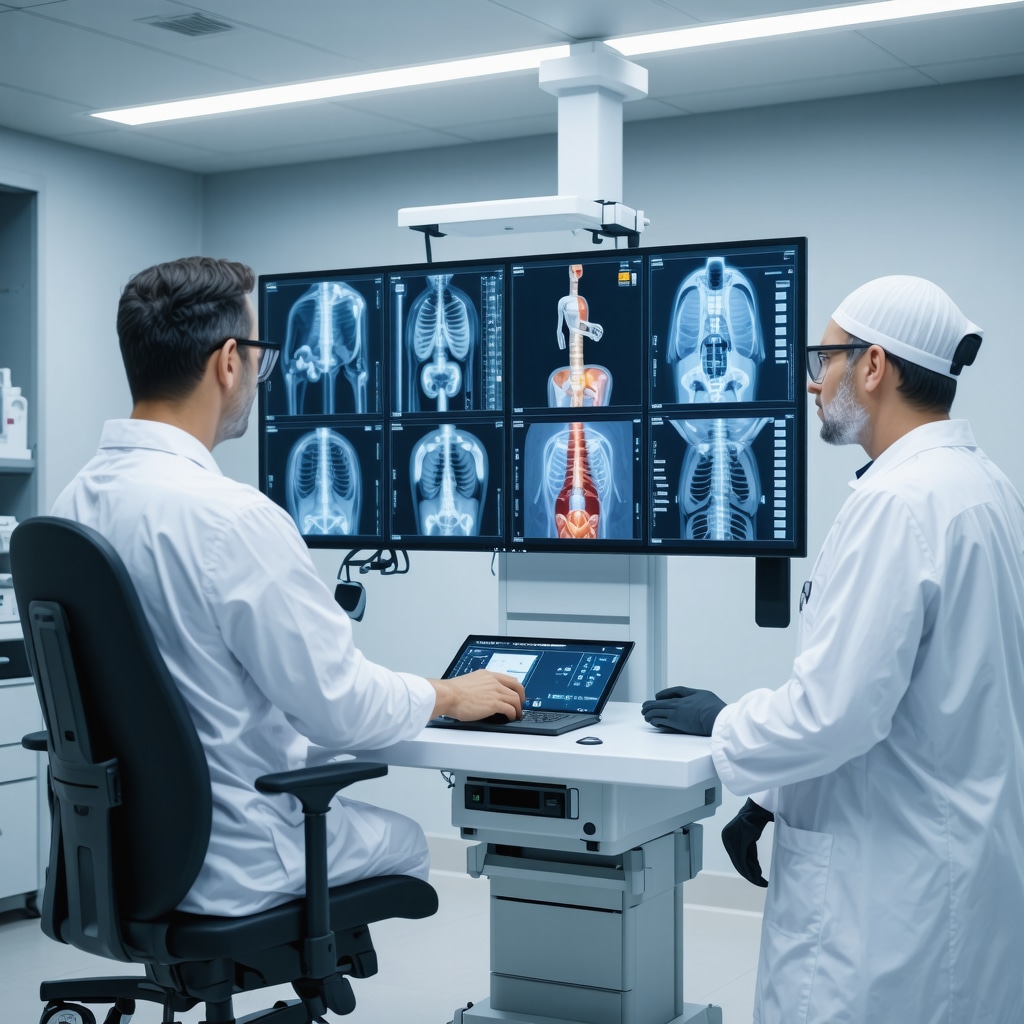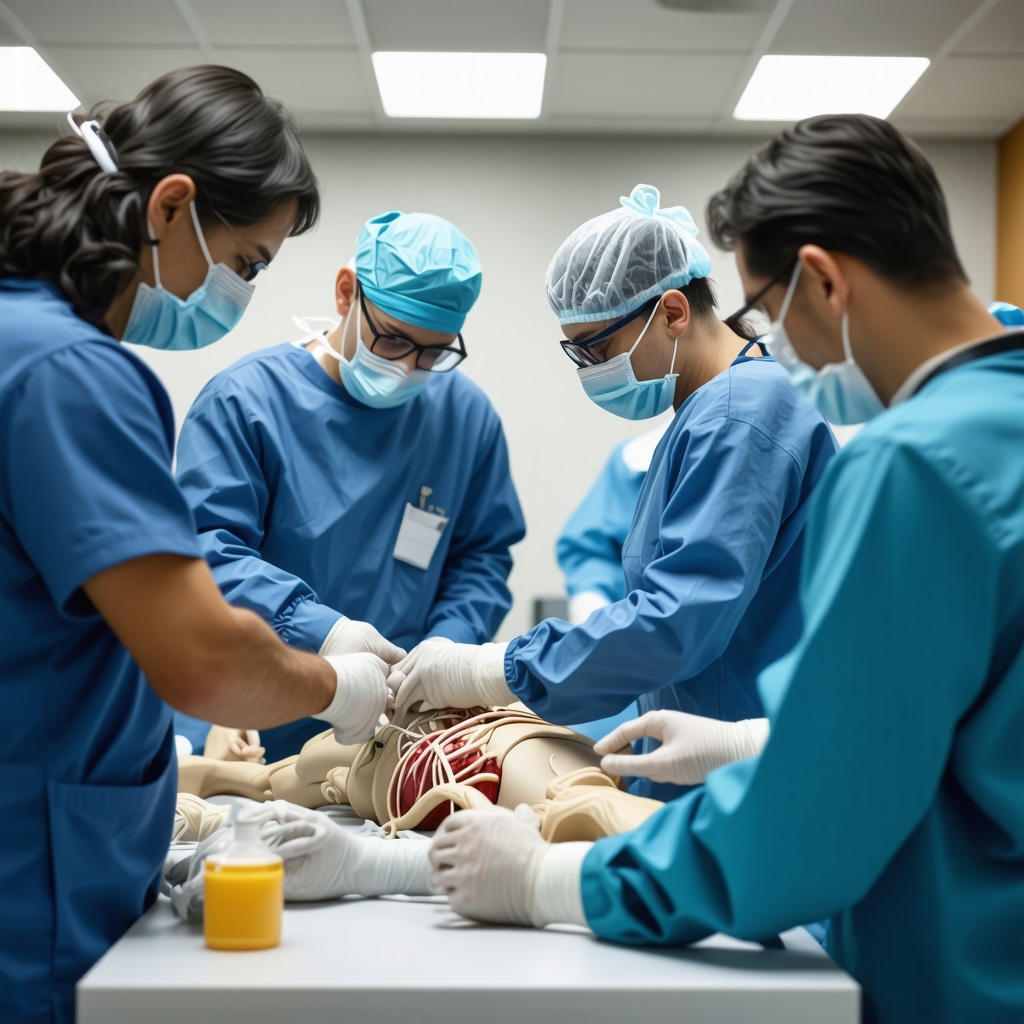Understanding the Complexities of Workers Comp Orthopedic Claims in NJ
New Jersey’s workers compensation system presents unique challenges, especially when it comes to orthopedic injuries. Orthopedic claims are often intricate due to the complex nature of musculoskeletal injuries and the detailed medical documentation required. Navigating the filing process requires not only a thorough understanding of orthopedic diagnoses but also familiarity with state-specific workers comp regulations, ensuring the injured worker receives timely and appropriate care.
Advanced Strategies for Streamlining Orthopedic Workers Compensation Claims
Effective filing begins with comprehensive documentation, including precise orthopedic evaluations and diagnostic imaging that correlate the injury to work-related activities. Leveraging multidisciplinary orthopedic care models can facilitate faster recovery and more robust claim substantiation. Incorporating detailed orthopedic notes, as discussed in effective orthopedic documentation techniques, enhances the claim’s credibility and expedites processing.
What Are the Critical Medical and Legal Nuances in NJ Workers Comp Orthopedic Claims?
One of the pivotal challenges lies in distinguishing work-related orthopedic conditions from pre-existing or degenerative issues. Expert orthopedic consultations must ascertain the causality with precision. The legal framework requires alignment with New Jersey’s specific workers compensation statutes, including timely reporting and adherence to medical provider networks. For deeper insights on optimizing orthopedic evaluations post-injury, see post-accident orthopedic evaluation essentials.
Integrating Specialized Orthopedic Care in Workers Compensation Recovery
Optimal recovery pathways involve tailored orthopedic interventions such as minimally invasive procedures, advanced facet joint treatments, or non-surgical care options. These treatments not only mitigate pain but also improve functional outcomes, which is crucial for justifying ongoing compensation benefits. Coordinating with top-rated orthopedic surgeons ensures adherence to best clinical practices, as highlighted in leading orthopedic spine specialists in NJ.
Leveraging Expert Knowledge to Expedite Claims and Enhance Patient Outcomes
Aligning workers comp claims with expert orthopedic assessments fosters a transparent and trustworthy claims process. By understanding the nuances of NJ workers comp law and orthopedic care, patients and providers can collaboratively reduce delays and disputes. This synergy supports both effective medical recovery and fair compensation determinations.
For a comprehensive guide on how to file workers comp for orthopedic injury in NJ, including step-by-step procedures and critical documentation tips, visit this detailed resource.
Explore further expert insights on orthopedic care and legal coordination to improve your workers comp claim experience.
Authoritative Source: For evidence-based practices and legal standards, refer to the New Jersey Department of Labor and Workforce Development – Workers’ Compensation, which provides official guidelines and updates on workers compensation claims management.
Decoding the Role of Diagnostic Imaging in Strengthening Workers Comp Orthopedic Claims
Diagnostic imaging serves as a cornerstone in substantiating orthopedic injuries under the New Jersey workers compensation system. Modalities such as MRI, CT scans, and X-rays provide objective evidence that links musculoskeletal damage directly to workplace incidents. However, the interpretation of these images requires expert orthopedic knowledge to differentiate acute work-related trauma from chronic or age-related changes. This distinction is critical in ensuring claims are not unduly denied or delayed due to ambiguous medical findings. Advanced non-surgical orthopedic diagnostics and treatment options further complement imaging insights by offering detailed clinical correlations that strengthen claim validity.
Optimizing Multidisciplinary Collaboration for Comprehensive Orthopedic Workers Comp Care
Integrating a multidisciplinary team approach, involving orthopedic surgeons, physical therapists, pain management specialists, and occupational therapists, dramatically enhances patient outcomes within workers comp cases. This collaboration facilitates tailored treatment plans that address not only the physical injury but also functional rehabilitation and psychosocial factors influencing recovery speed and success. Leveraging this model can reduce claim disputes by providing comprehensive, consistent medical narratives and progress documentation. Understanding the multidisciplinary orthopedic care model benefits is essential for practitioners aiming to maximize claim approvals and patient recovery trajectories.
How Can Emerging Technologies Revolutionize Orthopedic Workers Compensation Evaluations in New Jersey?
The advent of technologies such as 3D imaging, wearable movement trackers, and AI-driven diagnostic tools promises to transform orthopedic evaluations by delivering more precise, real-time assessments of injury severity and functional impairment. These innovations enable orthopedic specialists to quantify pain and mobility limitations objectively, thereby providing stronger evidence in workers comp claims. Moreover, integrating telemedicine consultations into the evaluation process can improve accessibility and reduce delays in diagnosis and treatment initiation, a critical factor in expediting claims processing.
Embracing these cutting-edge technologies requires orthopedic providers and legal professionals to stay informed and adapt protocols accordingly, ensuring that claims leverage the most advanced clinical evidence available.
For those navigating this complex intersection of care and claims, explore our detailed filing guide to align your documentation with current best practices.
Legal and Medical Synergy: Enhancing Orthopedic Workers Comp Success
The synergy between orthopedic expertise and legal acumen plays a pivotal role in advancing workers compensation claims. Orthopedic specialists must be adept not only in clinical diagnosis and treatment but also in articulating findings within the legal framework of NJ workers comp statutes. Detailed, clear, and medically sound documentation that addresses causation, prognosis, and functional limitations directly supports legal arguments for claim approval.
Attorneys benefit from collaborating closely with orthopedic providers to understand the nuances of orthopedic care pathways and ensure that medical evidence meets legal standards. This collaborative approach fosters transparency, reduces litigation risks, and accelerates resolution.
To deepen your understanding of these interdisciplinary dynamics, refer to the official New Jersey Department of Labor and Workforce Development – Workers’ Compensation guidelines which remain the authoritative source on regulatory compliance and claim best practices.
Engage with us: Share your experiences or questions about orthopedic workers comp claims in the comments below, and help foster a knowledgeable community navigating these complex claims.
Harnessing Telemedicine and Artificial Intelligence to Elevate NJ Workers Comp Orthopedic Evaluations
The infusion of telemedicine and artificial intelligence (AI) into orthopedic workers compensation claims is redefining how injuries are assessed and managed in New Jersey. Telemedicine facilitates remote consultations that bridge geographical and scheduling barriers, ensuring injured workers promptly access expert orthopedic opinions without unnecessary delays. This immediacy is crucial in the workers comp context, where treatment initiation speed directly correlates with claim outcomes and recovery trajectories.
Simultaneously, AI-driven diagnostic algorithms analyze medical imaging and patient-reported data with exceptional precision, identifying subtle patterns that may elude human observers. These technologies improve the objectivity and reproducibility of functional impairment assessments, which are often pivotal in contested claims. Integrating wearable sensors further enriches this data ecosystem by continuously monitoring mobility and biomechanical parameters, offering real-time insights into recovery progress.
How Does the Integration of AI and Telemedicine Address Challenges in Orthopedic Workers Compensation Claim Accuracy and Efficiency?
AI and telemedicine collectively tackle two primary challenges: diagnostic ambiguity and claim processing delays. By automating image interpretation and standardizing evaluation criteria, AI reduces subjective variability, a common source of dispute in workers comp claims. Telemedicine expedites expert access, minimizing waiting times for critical orthopedic evaluations and enabling prompt treatment plan adjustments. This synergy not only streamlines administrative workflows but also enhances claimant satisfaction through transparent and timely communication.
Evidence from recent clinical studies supports these advancements. For example, a 2023 publication in the Journal of Orthopedic Research highlights how AI-assisted MRI interpretation improved diagnostic accuracy for lumbar spine injuries by 15%, directly impacting claim validation efficacy (source).
Advanced Legal Considerations for AI-Enhanced Orthopedic Evidence in NJ Workers Compensation
While technological integration promises significant benefits, it introduces complex legal considerations. The admissibility of AI-generated reports in NJ workers compensation hearings hinges on transparency regarding algorithmic methodology and validation. Attorneys and orthopedic experts must collaboratively ensure that AI outputs are interpretable and conform with evidentiary standards. Moreover, telemedicine consultations must comply with state licensing requirements and maintain rigorous documentation to withstand legal scrutiny.
Proactive incorporation of these technologies demands updated protocols that align with the New Jersey Department of Labor and Workforce Development regulations. This harmonization not only fortifies claim legitimacy but also mitigates risks of procedural challenges that could delay compensation.
Strategic Implementation: Preparing Orthopedic Teams for AI and Telemedicine Integration
Successful adoption requires orthopedic teams to cultivate competencies in digital health tools and data analytics. Training programs focused on interpreting AI insights and optimizing telemedicine interactions are critical. Additionally, establishing interoperable electronic health record (EHR) systems that seamlessly capture and share orthopedic data enhances multidisciplinary collaboration, ensuring that all stakeholders have access to consistent and comprehensive information.
Such preparedness translates into well-documented claims, more persuasive medical narratives, and ultimately, improved patient outcomes. Stakeholders are encouraged to explore specialized certifications and workshops that deepen expertise in these emerging domains.

For practitioners and claimants seeking to navigate this evolving landscape, our comprehensive guide on filing workers comp orthopedic claims in NJ now includes dedicated sections on leveraging AI and telemedicine effectively.
Stay ahead with expert insights—engage with our ongoing series and share your experiences or questions to foster a thriving community of orthopedic workers compensation professionals.
Authoritative Source: For detailed regulatory guidance and updates on telemedicine and AI usage in workers compensation, refer to the New Jersey Department of Labor and Workforce Development – Workers’ Compensation.
Elevating Orthopedic Claims Through AI-Driven Predictive Analytics
Beyond diagnostic accuracy, artificial intelligence now empowers predictive modeling to forecast patient recovery trajectories in orthopedic workers compensation cases. By analyzing comprehensive datasets—including injury specifics, treatment responses, and rehabilitation progress—AI algorithms can identify patterns that predict outcomes such as time to maximum medical improvement or likelihood of permanent impairment. This predictive insight informs more tailored treatment plans and strategic claim management, reducing unnecessary delays and optimizing resource allocation.
Ensuring Compliance and Ethical Standards in AI-Augmented Workers Compensation Evaluations
As AI tools become increasingly integral, maintaining rigorous ethical standards and regulatory compliance is paramount. Orthopedic providers must ensure that AI algorithms employed are validated for clinical accuracy and free from biases that could inadvertently affect claim adjudications. Transparency in algorithm design and data usage aligns with New Jersey’s evolving legal expectations for evidence admissibility and patient privacy protections under HIPAA and state statutes.
How Can Orthopedic Teams Address Potential Biases and Data Integrity Issues in AI-Enhanced Workers Comp Claims?
Combating bias requires systematic evaluation of AI training datasets to ensure representativeness across demographics and injury types. Orthopedic teams should partner with data scientists to audit algorithm outputs regularly, verifying that clinical decisions supported by AI do not perpetuate disparities. Establishing robust data governance frameworks safeguards integrity and fosters trust among claimants, providers, and legal stakeholders. Such interdisciplinary vigilance is crucial to uphold fairness and accuracy in compensation determinations.
Innovations in Functional Capacity Evaluation: Integrating Wearables and AI Analytics
Functional Capacity Evaluations (FCEs) have traditionally relied on controlled clinical assessments; however, the integration of wearable sensors and AI analytics now allows continuous monitoring of patient function in real-world settings. These technologies capture granular data on movement patterns, exertion levels, and recovery progress, enhancing the objectivity of FCEs. This evolution provides compelling evidence for claim adjusters by illustrating functional limitations or improvements over time, directly influencing compensation and return-to-work decisions.

Fostering Collaborative Legal-Orthopedic Frameworks for Tech-Enhanced Claims
To fully leverage technological advancements, legal professionals must develop fluency in interpreting AI-generated reports and telemedicine documentation. Continuing legal education programs focused on digital health literacy enable attorneys to effectively challenge or support claims backed by sophisticated clinical evidence. Concurrently, orthopedic experts should be conversant with legal standards to produce admissible, comprehensible medical opinions. This synergy cultivates a proactive claims environment where disputes are minimized, and adjudications are expedited.
For a deep dive into cutting-edge workflows marrying AI, telemedicine, and legal best practices in NJ workers comp orthopedic claims, consult this specialized resource.
Engage with the forefront of workers compensation innovation: share your perspectives or inquire about integrating AI and telemedicine in orthopedic claims below.
Authoritative Source: For comprehensive regulatory guidance on AI and telemedicine in workers compensation, reference the New Jersey Department of Labor and Workforce Development – Workers’ Compensation.
Expert Insights & Advanced Considerations
Precision in Causation Assessment Is Paramount
Determining the exact causality between orthopedic injuries and workplace incidents requires meticulous clinical evaluation. Differentiating acute trauma from pre-existing degenerative changes is essential to avoid claim denials. Employing advanced diagnostic imaging interpretations and leveraging detailed orthopedic evaluations, as outlined in post-accident orthopedic evaluation essentials, strengthens the evidentiary basis of claims.
Integrated Multidisciplinary Care Enhances Recovery and Claim Validity
Coordinating care among orthopedic surgeons, physical therapists, and pain management specialists fosters comprehensive treatment plans that address both injury and functional rehabilitation. This approach not only accelerates patient recovery but also supplies consistent medical documentation crucial for claim substantiation. For an in-depth overview, see understanding the multidisciplinary orthopedic care model.
Embracing AI and Telemedicine Transforms Evaluation Accuracy and Efficiency
The integration of AI-driven diagnostic tools and telemedicine consultations reduces delays and increases diagnostic precision in orthopedic workers comp claims. These technologies enable objective assessment of injury severity and functional impairment, thereby facilitating more transparent and timely claims processing. Stakeholders should stay abreast of evolving legal standards concerning technology use to ensure compliance, as highlighted in advanced AI and telemedicine integration.
Ethical Oversight and Data Integrity Are Critical in AI-Augmented Claims
Ensuring AI algorithms are free from bias and validated for clinical accuracy safeguards fairness in claim adjudications. Orthopedic teams must collaborate with data scientists to audit AI outputs regularly and maintain robust data governance frameworks. This vigilance protects claimant trust and aligns with New Jersey’s regulatory expectations for evidence admissibility and patient privacy.
Predictive Analytics Offer Strategic Advantage in Claim Management
AI-powered predictive models forecasting recovery trajectories and potential impairments allow for more tailored treatment and optimized resource allocation. Incorporating these insights into orthopedic workers comp claims can reduce unnecessary delays and support strategic decision-making, enhancing both patient outcomes and claim resolution efficiency.
Curated Expert Resources
New Jersey Department of Labor and Workforce Development – Workers’ Compensation: The authoritative source for regulatory updates, claim filing procedures, and compliance standards essential for navigating NJ workers comp orthopedic claims (official site).
Post-Accident Orthopedic Evaluation Essentials: A comprehensive guide detailing critical evaluation steps and diagnostic considerations to substantiate orthopedic claims effectively (read more).
Understanding the Multidisciplinary Orthopedic Care Model Benefits: Insight into coordinated care approaches that optimize recovery and strengthen claims through consistent documentation (explore here).
Advanced AI and Telemedicine Integration in NJ Workers Comp: Specialized resource addressing legal and clinical considerations for embracing technology in orthopedic claims (learn more).
Effective Language for Orthopedic Notes in Work Injury Claims: Essential techniques for crafting persuasive medical documentation that supports claim approval (dive deeper).
Final Expert Perspective
Mastering workers comp orthopedic claims in New Jersey demands a multifaceted approach that blends clinical precision, multidisciplinary collaboration, and technological integration. The evolving landscape, enriched by AI and telemedicine, offers unprecedented opportunities to enhance diagnostic accuracy and streamline claims processing, provided ethical and legal standards are rigorously upheld. Prioritizing comprehensive documentation and staying informed through authoritative resources lays the foundation for successful claim outcomes and optimized patient care.
Professionals engaged in this domain are encouraged to deepen their expertise by exploring the linked resources and to contribute their insights or inquiries through direct outreach. Such engagement fosters a dynamic community dedicated to advancing orthopedic workers compensation excellence in New Jersey.


This article provides an insightful overview of the complexities involved in filing workers comp orthopedic claims in NJ. From my experience working with injured workers, I’ve seen how meticulous documentation — especially detailed orthopedic notes and imaging reports — can significantly streamline the approval process. The emphasis on multidisciplinary care is especially important, as it ensures comprehensive recovery and strengthens the claim.
One challenge I often encounter is effectively differentiating between work-related injuries and pre-existing degenerative issues. It seems that advanced diagnostic evaluations and expert testimonies are critical here, but I wonder how often claims get delayed or denied due to ambiguous medical findings. Have others found certain techniques particularly effective in proving causality?
Overall, integrating newer technologies like AI and telemedicine seems promising for future claim assessments. What are some practical ways practitioners can ensure these tools are used ethically and in compliance with NJ regulations? Would love to hear experiences from others navigating this evolving landscape.
This post highlights the increasing importance of integrating advanced diagnostic tools and multidisciplinary approaches in NJ workers comp claims, especially for orthopedic injuries. From my experience, utilizing detailed orthopedic evaluation techniques paired with high-resolution imaging significantly reduces the chances of claim denials. It’s fascinating to see how emerging technologies like AI can enhance the accuracy of injury assessments, but it’s crucial that their implementation complies with state regulations to maintain credibility. I’ve worked with clinics that have successfully integrated telemedicine consultations, allowing for timely second opinions and efficient documentation, which helps in establishing causality more firmly. However, ensuring that these technological tools are used ethically—such as maintaining patient privacy, avoiding biases in AI algorithms, and proper validation—is key to keeping the process transparent and legally sound. How have others found balancing technological innovations with legal compliance, particularly in environments with evolving standards like NJ? I believe fostering close collaboration between medical and legal teams can help navigate these complexities effectively.